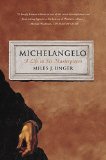Summary | Excerpt | Reviews | Beyond the Book | Readalikes | Genres & Themes | Author Bio

Critics' Opinion:
Readers' Opinion:
First Published:
Jul 2014, 448 pages
Paperback:
Jul 2015, 448 pages
 Book Reviewed by:
Book Reviewed by:
Suzanne Reeder
Buy This Book
I
Michelangelo: The Myth and the Man
Michael, more than mortal man, angel divine
—Ariosto, Orlando Furioso
I. MICHAEL, MORE THAN MORTAL MAN, ANGEL DIVINE
In the spring of 1548, Michelangelo Buonarroti dashed off a brief note to his nephew Lionardo in Florence. As was often the case with the seventy-three-year-old artist, he felt aggrieved. "Tell the priest not to write me any longer as 'Michelangelo sculptor,'?" he wrote in a huff, "because here [in Rome] I'm known only as Michelangelo Buonarroti, and if a Florentine citizen wants to have an altarpiece painted, he must find himself a painter. I was never a painter or a sculptor like one who keeps a shop. I haven't done so in order to uphold the honor of my father and brothers. While it is true that I have served three popes, that was only because I was forced to."
One reason for his annoyance was practical. As he suggests at the end of the letter where he enlists his nephew in a little deception—" . . . as to what I've just written, don't say anything to the priest because I wish him to think that I never received your letter"—there are other sculptors in Rome with similar names and any imprecision in the form of the address is likely to cause his mail to go astray. But the real explanation lies elsewhere. The priest has not only been careless: worse, he has misunderstood the nature of his calling. Michelangelo bristles at being mistaken for one of those daubers who hangs out a shingle advertising Madonnas and portraits to order and priced by the square foot. Nothing could be further from the truth, he tells Lionardo, as if he too needed to be reminded of the kind of man his uncle is. He is an artist, a visionary whose unique gift sets him apart from ordinary mortals.
In this petulant note—written in haste by an old man whose crankiness was exacerbated by a recent attack of kidney stones—we can sense the frustration that came from a lifetime spent battling those who viewed his profession with contempt. In the face of the skeptics and the scoffers, Michelangelo promoted a new conception of the artist, one in which the crass demands of commerce and the demeaning associations of manual labor have been sloughed off to reveal a creature as yet ill-defined but still thoroughly magnificent.
"I was never a painter or a sculptor like one who keeps a shop," he insists. But if not, what kind of artist is he? Implicit in Michelangelo's outburst is a radical claim: the painter or sculptor was no longer just a humble craftsman but a shaman or secular prophet, and the work of his hands was akin to holy writ.
Michelangelo's letter to his nephew offers a telling insight into the artist's state of mind, one that's all the more valuable for being private and unrehearsed. Precisely because there's so little at stake, and because the people involved were of no particular importance, we get the feeling we are peeking through the curtains and seeing the man as he really was when no one was looking, in his robe and slippers, his hair uncombed. The touchiness and fragile vanity Michelangelo displays are perhaps surprising, since by the time he wrote the letter he had already achieved a worldly success almost unparalleled for any artist in any age. "[W]hat greater and clearer sign can we ever have of the excellence of this man than the contention of the Princes of the world for him?" asked Ascanio Condivi, his friend and biographer. Courted by the greatest lords of Europe who begged for even a minor work from his hands, why bother to respond to a tactless Florentine nobody?
The truth is that the priest had touched him where he was most tender. Michelangelo's peevish response is a farcical echo of those epic battles with popes and princes who were often just as blind to the nature of his achievement. In fact, Michelangelo's entire life was a rebuke to those who thought the artist's job was to supply pretty images to order for anyone with a few ducats in his pocket. Michelangelo insisted that the purpose of art, at least when practiced at the highest level, was to channel the most profound aspirations of the human spirit. These could not be summoned at will or purchased like melons in the market. By stubbornly, even pugnaciously, pursuing this ideal, Michelangelo transformed both the practice of art and our conception of the artist's role in society.
Excerpted from Michelangelo by Miles J Unger. Copyright © 2014 by Miles J Unger. Excerpted by permission of Simon & Schuster. All rights reserved. No part of this excerpt may be reproduced or reprinted without permission in writing from the publisher.





The Flower Sisters
by Michelle Collins Anderson
From the new Fannie Flagg of the Ozarks, a richly-woven story of family, forgiveness, and reinvention.

The House on Biscayne Bay
by Chanel Cleeton
As death stalks a gothic mansion in Miami, the lives of two women intertwine as the past and present collide.

The Funeral Cryer by Wenyan Lu
Debut novelist Wenyan Lu brings us this witty yet profound story about one woman's midlife reawakening in contemporary rural China.
Your guide toexceptional books
BookBrowse seeks out and recommends the best in contemporary fiction and nonfiction—books that not only engage and entertain but also deepen our understanding of ourselves and the world around us.